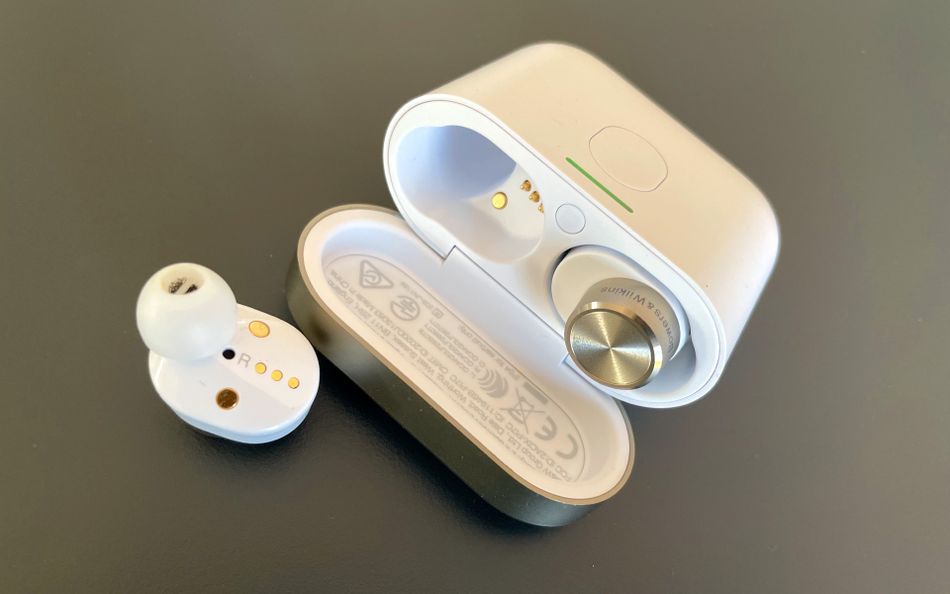British hi-fi company Bowers & Wilkins is renowned for its speakers. The company made the foray into building headphones a few years ago, with great results.
Now, it’s launching its first wireless earbuds: the Pi7, which is the flagship model, alongside the slightly less powerful Pi5.
Both models are visually similar: they’re truly wireless buds with an accompanying case that doubles as a charger (both wireless and wired, via a USB-C port).
The emphasis, as is typical for B&W, is on the sound. The Pi7 produces sound via Dual Hybrid Drive units with individual amplifiers for each driver, meaning that each bud has two built-in amps. It supports 24-bit sound and Qualcomm’s latest aptX Adaptive codec, which is the best you can get for hi-res wireless sound.
On the input side of things, the Pi7 has six microphones that both enhance the call quality, and help with adaptive noise cancellation.
The charging case has a few cool tricks. One is the fact that it charges wirelessly — just place it on a charging pad — and the other is something B&W calls “audio retransmission.” The case can connect to an external audio source, like an in-flight entertainment system, and then wirelessly retransmit audio from this source to the earbuds in high quality — pretty nifty on longer flights. Bonus: You get a 3.5mm to USB-C and a USB-C to USB-C cable in the box, so you can plug the case into pretty much anything.

B&W Pi7 come with a charging case that can be charged via a USB-C port or wirelessly.
Image: stan schroeder/Mashable
I’ve had a few days with the Pi7, and they’re the best sounding earbuds I’ve tried, with a decent sound stage, and deep, convincing bass. The sound is good enough that you can make out a big difference between a Spotify MP3 delivered via Apple’s AAC codec, and the FLAC version of the same track delivered via aptX. One thing I noticed was that the sound wasn’t tiring, even after longer listening sessions, probably due to the slightly subdued treble.
The noise cancellation works almost too good —when it was on, and the music was playing, I was unable to hear anything from the outside world. This has a downside: I couldn’t hear my daughter speaking even when I turned on the ambient pass-through feature, which uses the microphones on the earbuds to deliver outside sounds. Only when she came about two feet away did the ambient pass-through work.
It’s worth noting that the noise cancellation comes primarily from the snug fit, but turning the active NC on did further reduce droning and buzzing sounds from the outside.
The Pi7 earbuds are controlled via taps on both buds, which work reasonably well once you get used to them, but I did on occasion accidentally activate the wrong feature. Like other B&W headphones, they have a sensor that automatically pauses the music when you take them off, and starts it when you put them on again. Some features are missing: There’s no way to activate the ambient pass-through on the buds itself (you have to do it via B&W’s mobile app), which is a big omission.

The Pi7 fit very snugly, but they’re not the comfiest earbuds I’ve tried.
Image: stan schroeder/Mashable
The Pi7 fit well into my ears (you get two additional tips of different sizes if the default doesn’t work for you) and they fit very snugly, but I did feel slight discomfort in one of my ears after longer listening sessions. The buds are pretty big, so do take that into account, or try them out if you can, if your ears are on the smaller side.
To truly test out battery life of the Pi7, I’d need more time, but B&W claims they’ll last four hours between charges, which is decent but not best in class — for comparison, Apple’s AirPods offer 5 hours of listening time. The Pi7’s case offers up to four full recharges.
I didn’t get to try the Pi5, but they’re quite similar to the flagship model, the main differences being lack of hi-res audio support, and four mics instead of six.
Both the Pi5 and the Pi7 are available in charcoal or white. The price is $249 for the Pi5 and $399 for the Pi7.
